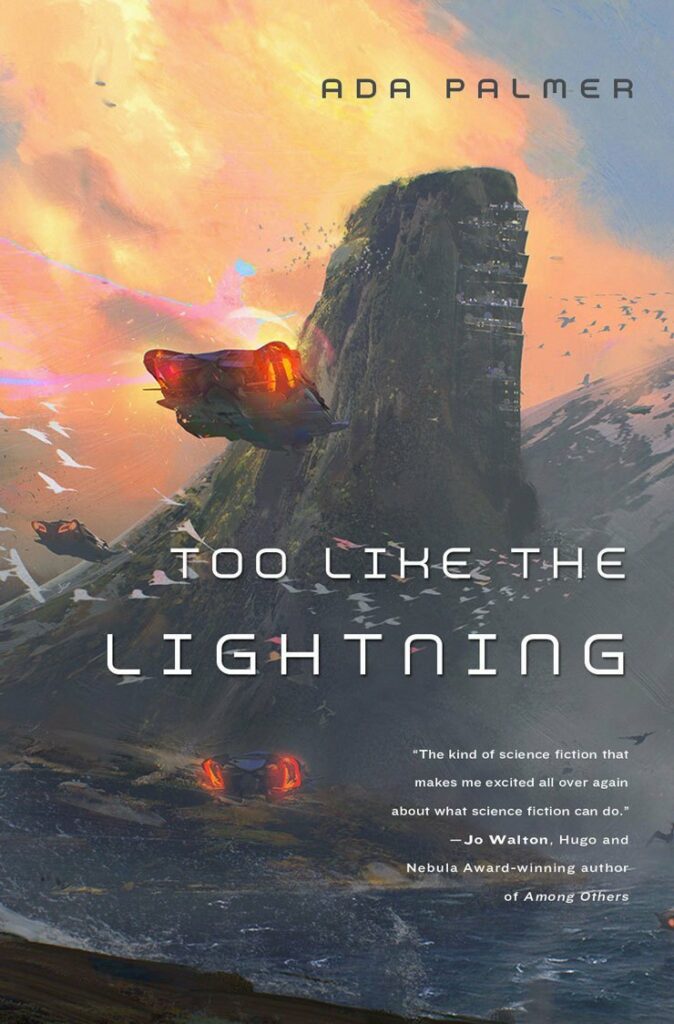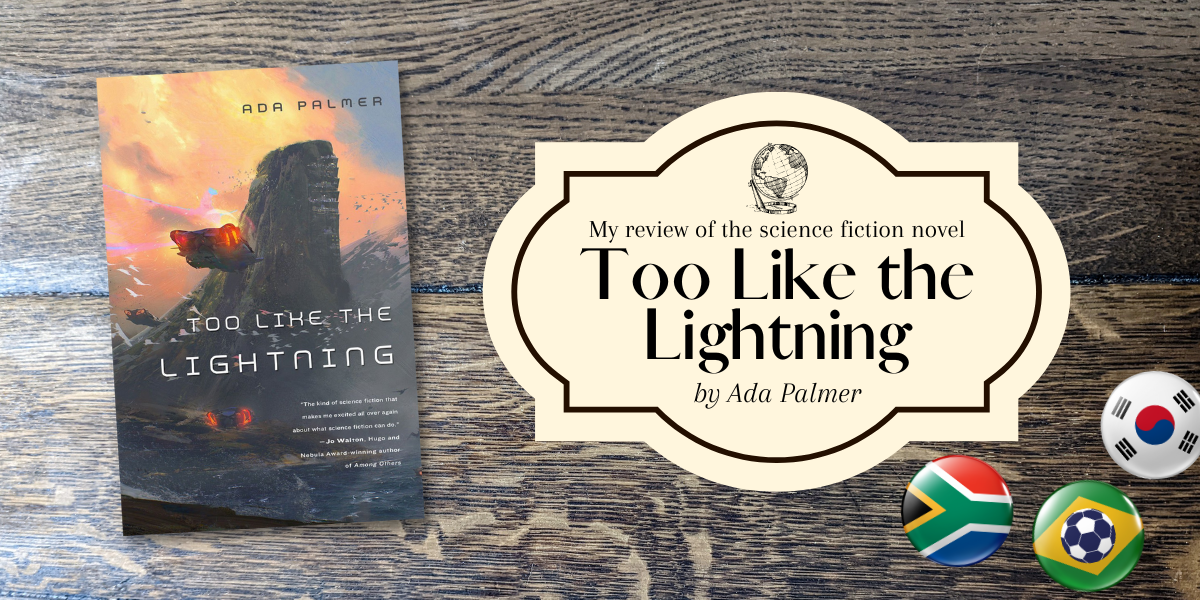Review of Too Like the Lightning by Ada Palmer. Too Like the Lightning is a science fiction book that plays with the idea that utopias are always a utopia for who? It is a deeply philosophical book that borrows much from 18th century philosophy. I have read Too Like the Lightning twice and I don’t think it will be the last reread I do of the series.
Review of Too Like the Lightning by Ada Palmer
My review of Too Like the Lightning by Ada Palmer
If you like large concept, mind-bending science fiction, you should give Too Like the Lightning a go. It starts slow and the style can be a bit hard to get into, but it very much worth the time and effort. It is the kind of book that will not hold your hand, but asks you to jump on the train and try to keep up.
The books only get better as the series goes on and the worldbuilding gets deeper, but takes up less space.

Title: Too Like the Lightning
Author: Ada Palmer
Series: Terra Ignota
Genre: Science fiction, hopepunk
Themes: Utopia, religion, political intrigue, found family, power
The blurb
Mycroft Canner is a convict. For his crimes he is required, as is the custom of the 25th century, to wander the world being as useful as he can to all he meets. Carlyle Foster is a sensayer–a spiritual counselor in a world that has outlawed the public practice of religion, but which also knows that the inner lives of humans cannot be wished away.
The world into which Mycroft and Carlyle have been born is as strange to our 21st-century eyes as ours would be to a native of the 1500s. It is a hard-won utopia built on technologically-generated abundance, and also on complex and mandatory systems of labeling all public writing and speech. What seem to us normal gender distinctions are now distinctly taboo in most social situations. And most of the world’s population is affiliated with globe-girdling clans of the like-minded, whose endless economic and cultural competition is carefully managed by central planners of inestimable subtlety. To us it seems like a mad combination of heaven and hell. To them, it seems like normal life.
And in this world, Mycroft and Carlyle have stumbled on the wild card that may destablize the system: the boy Bridger, who can effortlessly make his wishes come true. Who can, it would seem, bring inanimate objects to life…”
Too Like the Lightning is very much a book about power and power struggles. But is also a book that ask you to think about end ultimate expression of some of the real world struggles we have right now. What would a genderless society look like? How would a society function if you could live and work anywhere in the world but still find community?
Worldbuilding
What if instead of you being born into a country, you chose the nation (hive) you wanted to be a part of when you took your adult competency exam? What if you could live anywhere in the world and get to anywhere by flying car within 90 minutes? But the hives battle for political power and is a delicate balance that might tip, if one gets the majority.
As the blurb says the society in Too Like the Lightning is highly technologically advanced and is a post-scarcity world where nobody is fighting to fulfill their basic needs. That does no by any means mean that there is nothing to fight for. Because you can always fight for power…
Politics
The hive structure is the linchpin of much of the story, so it is worth spending a little more time on. There are seven major hives that make decisions for their own people and together they make the laws of the world. Everyone displays their affiliations proudly on their person via badges and strats and stilistic clothing choices. The hives each have a focus and a mindset that defines the people who choose to be a part of that hive.
Each hives governs their own people and that mean that when you choose a hive, you also chose a set of laws to follow. So two people on the same street do not necessarily have to follow the same laws, but they follow the laws of their hive.
Not every person is part of a hive, some are white-laws, grey-laws and black-laws – I will not talk more of that but let you explore that by reading the book – it’s really interesting…
The hives are:
The Masonic Empire: Wannabe roman empire with an emperor with dictatorial power.
The Cousins: Healthcare, kindness, teaching and social work of all kinds.
The Humanists: Human excellence, sportsmanship, competition
Mitsubishi: Money, power, landownerships, commers
The European Union: Democracy, national or ethnic heritages and identities
Gordian: Psychology and transhumanism
Utopia: Innovation, space
Gender
The book plays with a post-gender society and gender is taboo. One of the wars that goes before this world was a genderwar. Right now that feels quite possible in some parts of the world, you could say that they are already there. Our narrator, Mycroft, does however not care. Unlike in Ancillary Justice he assigns everyone a gender in the narrative as he sees fit. This means that we as the readers both get to see a world without gender function and Mycroft constantly reminding us that gendered concepts inhabits our minds.
But the book also look at the hunger some people have for gender expression and how that might play out in a society where that is not allowed.
Religion
The society has been through too many religious wars so they have outlawed all public expressions of religion as well as even talking about religion with anyone but your personal sensayer. The society recognizes that people need spirituality but tries to mitigate the negative effects of religious intergroup conflict. It is a really interesting take on the problem of religion.
Part of the religious element is also some supernatural elements involving Bridger who is a mysterious figure that is hard to discuss without spoiling way too much for a review. If I ever review the last book of the series, I will go into more detail here. Lets just say that you should be prepared for some supernatural elements in this otherwise science fiction story.
Story structure
Too Like the Lightning is many things all at once, which is a impressive for a book that is not even 500 pages (though four books). The story is told as an oral history of events told by our narrator Mycroft Canner, who will be the first to tell you that he is not the most reliable of narrators. He directly addresses the reader in the narration, which of course means that the book works very well as an audiobook. The reader he addresses is not us reading form the 21st century, but rather a contemporary or later reader of his own time.
“You will criticize me, reader, for writing in the style six hundred years removed from the event I describe, but you came to me for explanation of these days of transformation which left your world the world it is, and since it was the philosophy of the Eighteenth Century, heavy with optimism and ambition, whose abrupt revival birth the recent revolution, so it is only in the language of the Enlightenment, rich with opinion and sentiment, that those days can be described.”
The opening sentence of Too Like the Lightning
The style is meant to be that of a 18 century novel. Mycroft is still in the middle of the events when he starts his narrative, so he sometimes have the benefit of hindsight and sometimes doesn’t.
The story starts out trying to solve a mystery but constantly gets distracted by other events and telling us about the world. This means that the start of the book is a bit slow and very dense, but it does pick up the pace as it goes.
From my original review in 2017
“Too Like the Lightning was a book, that I would never have picked up, if it had not been gifted to me. I am however very happy that I did read it. I read it as part of this year’s (2017) Hugo reading.
It took the book about 100 pages to really get it’s tentacles around me and capture me. It is a very strange book, both plot driven and not at all. It is a book filled with weird characters and where you do not know who to trust – not really. The style is also very different. It is constantly referring to philosophers of the 18th century Europe – but it does it well and while assuming that the reader can and do follow, with out assuming that you know them all by heart before hand.
It is very much a book that play with our current social politics. That takes them to an extreme but apparent utopia and takes a hard look at that. It is very much a book about politics – both the game of politics and the political issues. It is also a book about found family and about religion.
I was sucked into the book to the degree that it felt like it was read aloud to me in my head. I had the feeling of it being told to me.
Right now I am not sure how much I liked the book, if it is a four or five star book – but it was definitely a book that made me think – and I will need some pallet cleansing short stories before I read my next novel. And I do plan to read the next book in the series – because this was quite a journey and I want to know where it ends. What it all means.”
The stats: Too Like the Lightning
Published: 2016 by Tor Books
Length: 432 pages
Read: 29 May 2017 & September 2022
Author: Female, white, disabled, USA


Leave a Reply